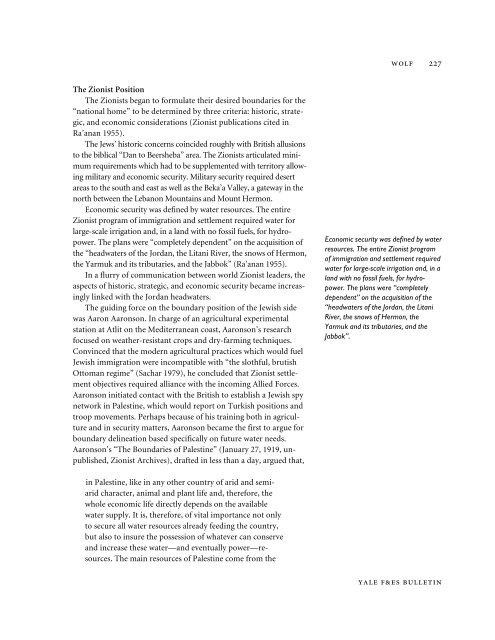Hydrostrategic Decisionmaking and the Arab ... - Yale University
Hydrostrategic Decisionmaking and the Arab ... - Yale University
Hydrostrategic Decisionmaking and the Arab ... - Yale University
Create successful ePaper yourself
Turn your PDF publications into a flip-book with our unique Google optimized e-Paper software.
WOLF 227The Zionist PositionThe Zionists began to formulate <strong>the</strong>ir desired boundaries for <strong>the</strong>“national home” to be determined by three criteria: historic, strategic,<strong>and</strong> economic considerations (Zionist publications cited inRa’anan 1955).The Jews’ historic concerns coincided roughly with British allusionsto <strong>the</strong> biblical “Dan to Beersheba” area. The Zionists articulated minimumrequirements which had to be supplemented with territory allowingmilitary <strong>and</strong> economic security. Military security required desertareas to <strong>the</strong> south <strong>and</strong> east as well as <strong>the</strong> Beka’a Valley, a gateway in <strong>the</strong>north between <strong>the</strong> Lebanon Mountains <strong>and</strong> Mount Hermon.Economic security was defined by water resources. The entireZionist program of immigration <strong>and</strong> settlement required water forlarge-scale irrigation <strong>and</strong>, in a l<strong>and</strong> with no fossil fuels, for hydropower.The plans were “completely dependent” on <strong>the</strong> acquisition of<strong>the</strong> “headwaters of <strong>the</strong> Jordan, <strong>the</strong> Litani River, <strong>the</strong> snows of Hermon,<strong>the</strong> Yarmuk <strong>and</strong> its tributaries, <strong>and</strong> <strong>the</strong> Jabbok” (Ra’anan 1955).In a flurry of communication between world Zionist leaders, <strong>the</strong>aspects of historic, strategic, <strong>and</strong> economic security became increasinglylinked with <strong>the</strong> Jordan headwaters.The guiding force on <strong>the</strong> boundary position of <strong>the</strong> Jewish sidewas Aaron Aaronson. In charge of an agricultural experimentalstation at Atlit on <strong>the</strong> Mediterranean coast, Aaronson’s researchfocused on wea<strong>the</strong>r-resistant crops <strong>and</strong> dry-farming techniques.Convinced that <strong>the</strong> modern agricultural practices which would fuelJewish immigration were incompatible with “<strong>the</strong> slothful, brutishOttoman regime” (Sachar 1979), he concluded that Zionist settlementobjectives required alliance with <strong>the</strong> incoming Allied Forces.Aaronson initiated contact with <strong>the</strong> British to establish a Jewish spynetwork in Palestine, which would report on Turkish positions <strong>and</strong>troop movements. Perhaps because of his training both in agriculture<strong>and</strong> in security matters, Aaronson became <strong>the</strong> first to argue forboundary delineation based specifically on future water needs.Aaronson’s “The Boundaries of Palestine” (January 27, 1919, unpublished,Zionist Archives), drafted in less than a day, argued that,Economic security was defined by waterresources. The entire Zionist programof immigration <strong>and</strong> settlement requiredwater for large-scale irrigation <strong>and</strong>, in al<strong>and</strong> with no fossil fuels, for hydropower.The plans were “completelydependent” on <strong>the</strong> acquisition of <strong>the</strong>“headwaters of <strong>the</strong> Jordan, <strong>the</strong> LitaniRiver, <strong>the</strong> snows of Hermon, <strong>the</strong>Yarmuk <strong>and</strong> its tributaries, <strong>and</strong> <strong>the</strong>Jabbok”.in Palestine, like in any o<strong>the</strong>r country of arid <strong>and</strong> semiaridcharacter, animal <strong>and</strong> plant life <strong>and</strong>, <strong>the</strong>refore, <strong>the</strong>whole economic life directly depends on <strong>the</strong> availablewater supply. It is, <strong>the</strong>refore, of vital importance not onlyto secure all water resources already feeding <strong>the</strong> country,but also to insure <strong>the</strong> possession of whatever can conserve<strong>and</strong> increase <strong>the</strong>se water—<strong>and</strong> eventually power—resources.The main resources of Palestine come from <strong>the</strong>YALE F&ES BULLETIN
















